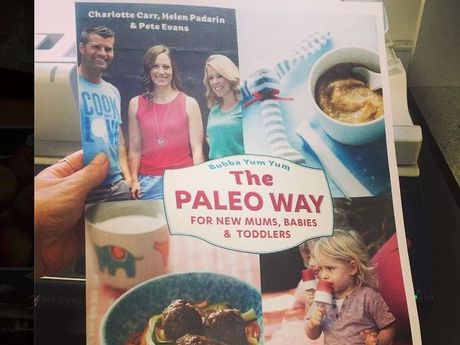 Bubba Yum Yum, The Paleo Way for New Mums, Babies and Toddlers was co-authored by celebrity chef Pete Evans, blogger Charlotte Carr and naturopath Helen Padarin.
Bubba Yum Yum, The Paleo Way for New Mums, Babies and Toddlers was co-authored by celebrity chef Pete Evans, blogger Charlotte Carr and naturopath Helen Padarin.CELEBRITY chef Pete Evans’ book on putting babies on the paleo diet is earning health warnings, with dieticians now warning the DIY infant formula recipe has 800% more salt than recommended.
The book “Bubba Yum Yum” is authored by the celebrity chef with Charlotte Carr and Helen Padarin.
It is now being delayed by Pan Macmillan after the health concerns were raised.
OPINION: Why would you listen to self-proclaimed experts?
The trio are described as “health crusaders” who offer the book as a way for parents to “serve up simple, delicious paleo recipes for new mothers, babies and toddlers.
Dieticians are warning some recipes will put babies at risk of botulism and salmonella, by encouraging bubs to eat honey, runny eggs and raw liver.
Check out the national Healthy Eating For Children guidelines
The Dieticians Association of Australia say the book’s DIY Formula claims to be comparable to breast milk, but the analysis of the mixture proves that’s not the case.
Compared to breast milk, this mixture has seven times as much Vitamin A, 20-times as much Vitamin B12, twice as much protein, 10 times as much iron and eight times as much salt.
“This formula could be very harmful to infants, their immature immune and digestive systems could not cope with this formulation and the levels of these nutrients it contains,” the dieticians wrote in a statement.
“In a newborn, the formulation could cause permanent damage and possibly result in death”
 Pete Evans delivered his paleo way message to Toowoomba residents. Photo Contributed Contributed
Pete Evans delivered his paleo way message to Toowoomba residents. Photo Contributed Contributed
On Friday, CHOICE warned that using the book for your baby amounted to “gambling with your infant’s health on a celebrity-driven diet fad”.
“If you are concerned about your child’s diet and the amount of nutrition they are receiving, you should consult your family doctor, not a celebrity chef,” spokesman Tom Godfrey said.
The Public Health Association of Australia recommends new mothers consider “breast is best” but if not available, then mothers should use infant formula, which is governed by the food standards code.
WHAT IS PALEO:
- Advocates of the paleo diet encourage people to cut out foods such as grains, legumes, dairy products, non-organic produce and processed foods.
- They recommend more meat, seafood, fresh fruit and veggies, fewer carbohydrates and a higher fibre intake.
